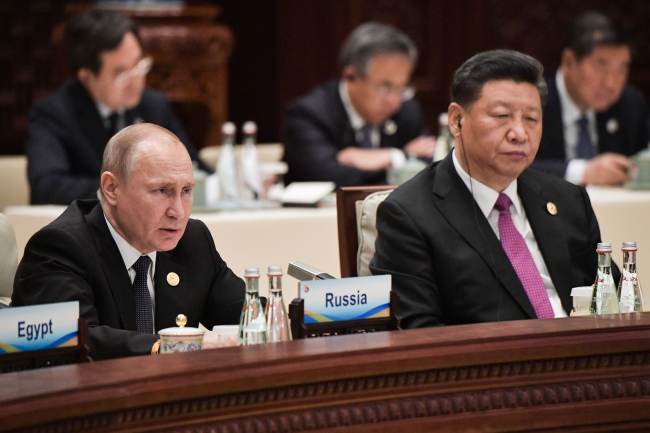Revival of six-party talks on North Korea unlikely: experts
By Park Han-naPublished : April 29, 2019 - 18:08
Russian President Vladimir Putin’s call for multilateral dialogue to provide an international security guarantee for North Korea has raised the possibility of resuming six-party talks, but experts said this is highly unlikely.
The talks involving the two Koreas, the US, China, Russia and Japan began in 2003 in an effort to persuade the North to give up its nuclear ambitions. But the talks collapsed in 2008 mainly because the North denied access to its nuclear facilities.
The talks involving the two Koreas, the US, China, Russia and Japan began in 2003 in an effort to persuade the North to give up its nuclear ambitions. But the talks collapsed in 2008 mainly because the North denied access to its nuclear facilities.

On Sunday, US President Donald Trump’s national security adviser John Bolton rejected a return to six-party talks, saying the US president is not trying to exclude other countries from the nuclear talks but “I think it’s not our preference.”
“He still looks forward to the possibility of a third summit with Kim. He feels pretty strongly about it,” he said.
His remarks came after Putin and North Korean leader Kim Jong-un held their first summit in Vladivostok on Thursday.
At a press conference following the summit, Putin said he believed any US guarantees might need to be supported by other nations.
“I am deeply convinced that if we reach a situation when we need to work out certain guarantees for one of the parties, in this case, security guarantees for the Democratic People’s Republic of Korea, then international guarantees will have to come into the picture,“ Putin said.
Lee Woo-young, a professor at University of North Korean Studies, says that with the exception of the US, all the countries that participated in the six-party talks would like to resume dialogue in that format to flex their muscles.
“Despite the support of other countries, I don’t think the six-party talks will happen soon because the US doesn’t want it,” he said.
However, the six-party talks could be used by North Korea against the US, as three of the participants -- China and Russia and South Korea -- would stand by the communist country, Lee said.
Koh Yu-hwan, a professor of North Korean Studies at Dongguk University, said multilateral talks will create a favorable environment for North Korea to pursue its preferred approach -- an incremental denuclearization process with timely concessions from the US.
“The US will only have Japan to support its big deal approach, while China, Russia and South Korea are likely to underpin the North’s simultaneous step-by-step method,” Koh said.
One of the shortcomings of involving all the negotiating partners in talks is low efficiency, as it may take a long time to present a united front.
“To issue a joint statement on agreed steps toward denuclearization, it took over two years for the six parties to achieve the first breakthrough in 2005,” Koh said.
He was referring to the Sept. 19, 2005 statement in which North Korea pledged to abandon “all nuclear weapons and existing nuclear programs” and return to the Treaty on the Non-Proliferation of Nuclear Weapons. North Korea withdrew from the talks in 2009 following an announcement in August 2008 that it was reversing measures to disable its weapons and programs.
By Park Han-na (hnpark@heraldcorp.com)









![[Today’s K-pop] BTS pop-up event to come to Seoul](http://res.heraldm.com/phpwas/restmb_idxmake.php?idx=644&simg=/content/image/2024/04/17/20240417050734_0.jpg&u=)

![[Graphic News] More Koreans say they plan long-distance trips this year](http://res.heraldm.com/phpwas/restmb_idxmake.php?idx=644&simg=/content/image/2024/04/17/20240417050828_0.gif&u=)






![[KH Explains] Hyundai's full hybrid edge to pay off amid slow transition to pure EVs](http://res.heraldm.com/phpwas/restmb_idxmake.php?idx=652&simg=/content/image/2024/04/18/20240418050645_0.jpg&u=20240419100350)

